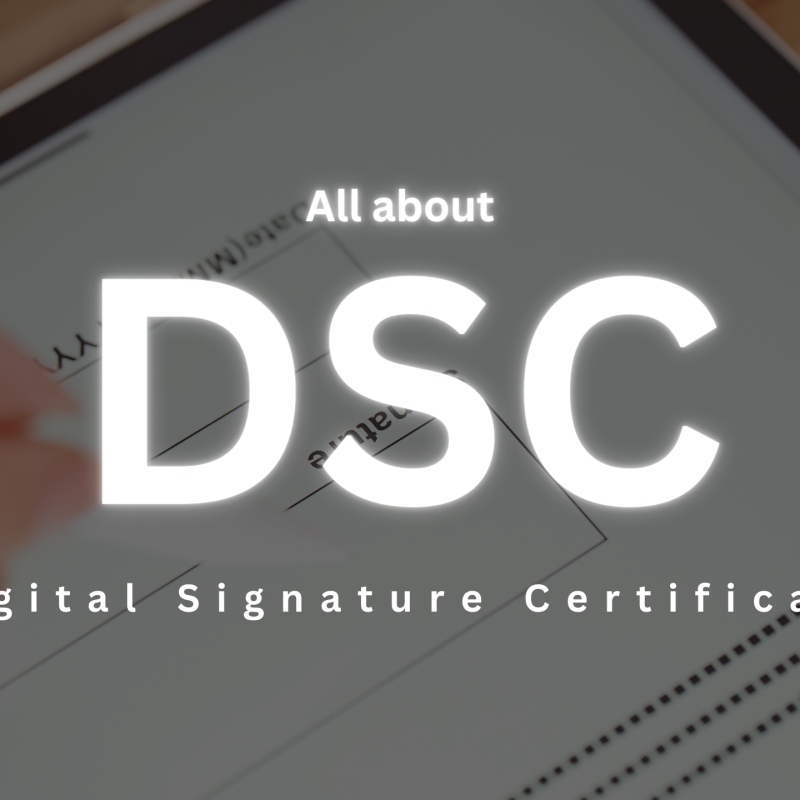What is a Digital Signature Certificate (DSC)?
A Digital Signature Certificate is an electronic document that serves as a digital equivalent of a physical signature. It is issued by a Certifying Authority (CA) and contains information about the identity of the certificate holder, including their name, email address, and the public key used for encryption. The primary purpose of a DSC is to ensure the authenticity and integrity of electronic documents.
Types of Digital Signature Certificates
1. Class 1 DSC: Primarily used for securing emails and personal identification. It verifies the email address of the applicant.
2. Class 2 DSC: Used for filing documents with the Registrar of Companies (RoC) and other government departments. It verifies the identity of the applicant against a trusted database.
3. Class 3 DSC: Required for participating in e-auctions and for businesses that need to ensure the highest level of security and identity verification. It allows the holder to sign documents and conduct transactions online securely.
Importance of DSC for Businesses
Businesses in India are required to use DSCs for various compliance and regulatory filings, including:
- E-Filing: All forms submitted to the MCA, such as incorporation documents, annual returns, and financial statements, must be digitally signed using a DSC. This requirement streamlines the filing process and enhances security by ensuring that only authorized individuals can submit documents on behalf of the company.
- Corporate Governance: DSCs help in maintaining transparency and accountability within corporate governance frameworks. They ensure that all electronic communications and transactions are secure and verifiable.
- Legal Validity: Documents signed with a DSC carry the same legal weight as those signed with a physical signature, thus facilitating smoother operations and compliance with legal requirements.
How to Obtain a Digital Signature Certificate
The process of obtaining a DSC involves several steps:
1. Choose a Certifying Authority: Select a recognized Certifying Authority (CA) that issues DSCs. In India, the Ministry of Electronics and Information Technology (MeitY) provides a list of licensed CAs.
2. Fill Out the Application: Complete the application form provided by the CA. This typically requires personal and business details.
3. Submit Required Documents: Provide necessary documentation, including identity proof, address proof, and photographs. The specific requirements may vary depending on the type of DSC being applied for.
4. Verification Process: The CA will verify the submitted documents. For Class 2 and Class 3 DSCs, this may involve additional verification steps, such as a video verification process.
5. Receive the DSC: Once verified, the CA will issue the DSC, which can be downloaded and installed on the user’s computer.
Best Practices for Using DSC
1. Secure Storage: Store the DSC in a secure location, such as a USB token or hardware security module (HSM), to prevent unauthorized access.
2. Regular Updates: Keep the DSC updated and renew it before its expiration date to avoid disruptions in business operations.
3. Training and Awareness: Educate employees about the importance of DSCs and the proper procedures for using them to ensure compliance and security.
4. Monitor Usage: Regularly monitor the usage of DSCs within the organization to detect any unauthorized or suspicious activities.
Conclusion
Digital Signature Certificates are essential for businesses operating in a digital environment, particularly in India. They not only facilitate compliance with regulatory requirements but also enhance security and trust in electronic transactions. By understanding the types of DSCs, the application process, and best practices for usage, businesses can effectively leverage this technology to streamline their operations and maintain compliance with legal standards.
FAQs
1. What is a Digital Signature Certificate (DSC)?
A Digital Signature Certificate (DSC) is an electronic form of a signature that serves as proof of identity for online transactions. It is used to authenticate the identity of the sender of a document and ensure the document's integrity.
2. How can I apply for a DSC?
You can apply for a DSC by directly approaching a Certifying Authority (CA) with the required documents. Alternatively, if the CA offers Aadhar eKYC-based authentication, you can obtain a DSC without submitting any additional documents.
3. What documents are needed to apply for a DSC?
If applying directly through a CA, you'll need to provide original supporting documents along with self-attested copies. If using Aadhar eKYC, no additional documents are required. A certified letter from your bank with your details can also be used as a supporting document.
4. How long does it take to get a DSC?
The time to obtain a DSC can vary depending on the Certifying Authority. Generally, it can take anywhere from 1 to 3 working days after submitting the required documents and completing the verification process.
5. Is a DSC legally valid?
Yes, a DSC is legally valid under the Information Technology Act, 2000, in India. It is recognized as a secure method for signing electronic documents, ensuring authenticity and integrity.
For more compliance-related services and queries, explore Company24.in or call us at +91 9216472424 to simplify your business journey. And join our WhatsApp community to get detailed regular updates.






